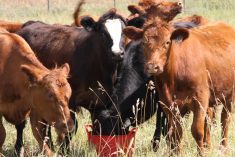Government rules that require livestock producers to repay emergency cash advances over the next two years or face default will drive many out of the business, says a provincial farm leader.
Ernie Mutch, president of the Prince Edward Island Federation of Agriculture, told the House of Commons agriculture committee last week that with cattle advance repayments due to start June 1, 2011, and hog advances scheduled to start in March 2012 with a 10-month repayment schedule, many producers will not be able to do it.
And if they default, they will have to pay interest (0.25 percent) on the entire advance, including the $100,000 originally interest free back to the date of the loan. As well, producers would be ineligible for advance payments on any other commodity they produce.
Read Also

Organic farmers urged to make better use of trade deals
Organic growers should be singing CUSMA’s praises, according to the Canadian Chamber of Commerce.
“We realized when we took the loans out for the advance payment program that they were loans and we would have to pay them back but we cannot realistically afford to do so within the current proposed framework,” he told MPs.
Mutch said he was appealing to the government to extend the repayment period to at least five years.
Eighty percent of P.E.I. hog producers and 50 percent of beef producers have gone out of business since 2007, he said.
“If P.E.I. producers are forced to repay these loans in the time frame outlined under the latest day of default, we will certainly lose more.”
Mozart, Sask., cow-calf producer Linda Oliver complained that while water-soaked grain producers have received some government help, her sector has been left out.
While opposition MPs were sympathetic to the farmer complaints about program failure, Saskatchewan Conservative Randy Hoback said he worried that programs are meant to be a “bridge” for an industry until good times return. When good times have not returned years later, perhaps the world has changed.
“Where I get a little concerned is when bridge programs become social programs because that then tells me something has to change,” he said. “That tells me that the industry has changed or something else structurally has changed in your situation that forces you to make a decision that you may not like to make.”
Mutch said he understood the point that loans cannot be open-ended. “You can only go so long.”














